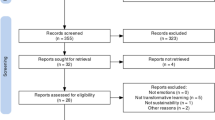Abstract
The rapidly changing environment requires an ability for critical reflection. In this chapter, I suggest that our abilities to engage in transformative learning and critical reflection on our taken-for-granted assumptions may be significantly strengthened by gently yet critically harnessing ‘edge-emotions’ as our guiding friends in the processes of learning and development. The theory of edge-emotions argues that resistance to reflection is deeply rooted in the biology of emotions and cognitive functions acting together in favour of self-preservation. This chapter offers an understanding of the dynamics of edge-emotions and suggests ways in which we can learn to harness edge-emotions in practice for supporting critical reflection and transformative learning.
Access this chapter
Tax calculation will be finalised at checkout
Purchases are for personal use only
Similar content being viewed by others
Notes
- 1.
Shayna Hornstein used this term in the workshop that she and Jude Walker conducted at the Interrogating Transformative Processes in Learning, ESREA Network Conference, Milan, Italy, June 2018.
References
Belenky, M. F., & Stanton, A. V. (2000). Inequality, development, and connected knowing. In J. Mezirow & Associates (Eds.), Learning as transformation: Critical perspectives on a theory in progress (pp. 71–102). San Francisco: Jossey-Bass.
Bengtsson, J. (2013). Embodied experience in educational practice and research. Studies in Philosophy and Education, 32(1), 39–53.
Brookfield, S. D. (1994). Tales from the dark side: A phenomenography of adult critical reflection. International Journal of Lifelong Education, 13(3), 203–216.
Clark, M. C., & Wilson, A. L. (1991). Context and rationality in Mezirow’s theory of transformational learning. Adult Education Quarterly, 41(2), 75–91.
Damasio, A. R. (1999). The feeling of what happens: The body and emotion in the making of consciousness. New York: Hart Court Brace.
Damasio, A. R. (2010). Self comes to mind. Constructing the conscious brain. New York: Pantheon Books.
Dirkx, J. (2008). The meaning and role of emotions in adult learning. New Directions for Adult and Continuing Education, 120, 7–18.
Ergas, O. (2015). The deeper teachings of mindfulness-based curricular interventions as a reconstruction of “education”. Journal of Philosophy of Education, 49(2), 204–220.
Festinger, L. (1957). A theory of cognitive dissonance. Stanford, CA: Stanford University Press.
Greenberg, L. S., & Paivio, S. (2003). Working with emotions in psychotherapy. New York: The Guilford Press.
Grossman, D. (2004). On combat: The psychology and physiology of deadly conflict in war and in peace. Millstadt: Warrior Science Publications.
Hämäläinen, T. J. (2014). In search of coherence: Sketching a theory of sustainable well-being. In T. J. Hämäläinen & J. Michaelson (Eds.), Well-being and beyond – Broadening the public and policy discourse. Cheltenham: Edward Elgar Publishing.
Illeris, K. (2004). Transformative learning in the perspective of a comprehensive learning theory. Journal of Transformative Education, 2, 79–89.
Illeris, K. (2007). How we learn: Learning and non-learning in school and beyond. London: Routledge.
Immordino-Yang, M. H., & Damasio, A. (2007). We feel, therefore we learn. The relevance of affective and social neuroscience to education. Mind, Brain and Education, 1(1), 3–10.
Jokikokko, K. (2009). The role of significant others in the intercultural learning of teachers. Journal of Research in International Education, 8(2), 143–164.
Jordi, R. (2011). Reframing the concept of reflection: Consciousness, experiential learning, and reflective learning practices. Adult Education Quarterly, 61(2), 181–197.
Kaufman, P. (2017). Critical contemplative pedagogy. Radical Pedagogy, 14(1), 1–20.
Mälkki, K. (2010). Building on Mezirow’s theory of transformative learning: Theorizing the challenges to reflection. Journal of Transformative Education, 8(1), 42–62.
Mälkki, K. (2011). Theorizing the nature of reflection. Doctoral dissertation, University of Helsinki, Institute of Behavioural Sciences. Studies in Educational Sciences, 238.
Mälkki, K. (2012). Rethinking disorienting dilemmas within real-life crises: The role of reflection in negotiating emotionally chaotic experiences. Adult Education Quarterly, 62, 207–229.
Mälkki, K., & Green, L. (2016). Ground, warmth, and light: Facilitating conditions for reflection and transformative dialogue. Journal of Educational Issues, 2(2), 169–183.
Mezirow, J. (1981). A critical theory of adult learning and education. Adult Education, 32, 3–24.
Mezirow, J. (1991). Transformative dimensions of adult learning. San Francisco: Jossey-Bass.
Mezirow, J. (2000). Learning to think like an adult: Core concepts of transformation theory. In J. Mezirow & Associates (Eds.), Learning as transformation: Critical perspectives on a theory in progress (pp. 3–33). San Francisco: Jossey-Bass.
Mezirow, J. (2009). An overview on transformative learning. In K. Illeris (Ed.), Contemporary theories of learning: Learning theorists in their own words (pp. 90–105). London: Routledge.
Newman, M. (2012). Calling transformative learning into question: Some mutinous thoughts. Adult Education Quarterly, 62, 36–55.
Raami, A. (2019). Toward solving the impossible problems. In J. W. Cook (Ed.), Sustainability, human well-being and the future of education (pp. 201–233). London: Palgrave Macmillan.
Siegel, D. J. (2010). Mindsight: The new science of personal transformation. New York: Bantam Books.
Siegel, D. J. (2012). Pocket guide to interpersonal neurobiology: An integrative handbook of the mind. New York: W. W. Norton.
Taylor, E. W. (2007). An update of transformative learning theory: A critical review of the empirical research (1999–2005). International Journal of Lifelong Education, 26, 173–191.
Walker, J., & Palacios, C. (2016). A pedagogy of emotion in teaching about social movement learning. Teaching in Higher Education, 21(2), 175–190.
Yorks, L., & Kasl, E. (2002). Toward a theory and practice for whole-person learning: Reconceptualizing experience and the role of affect. Adult Education Quarterly, 25(3), 176–192.
Author information
Authors and Affiliations
Corresponding author
Editor information
Editors and Affiliations
Rights and permissions
Copyright information
© 2019 The Author(s)
About this chapter
Cite this chapter
Mälkki, K. (2019). Coming to Grips with Edge-Emotions: The Gateway to Critical Reflection and Transformative Learning. In: Fleming, T., Kokkos, A., Finnegan, F. (eds) European Perspectives on Transformation Theory. Palgrave Macmillan, Cham. https://doi.org/10.1007/978-3-030-19159-7_5
Download citation
DOI: https://doi.org/10.1007/978-3-030-19159-7_5
Published:
Publisher Name: Palgrave Macmillan, Cham
Print ISBN: 978-3-030-19158-0
Online ISBN: 978-3-030-19159-7
eBook Packages: EducationEducation (R0)




